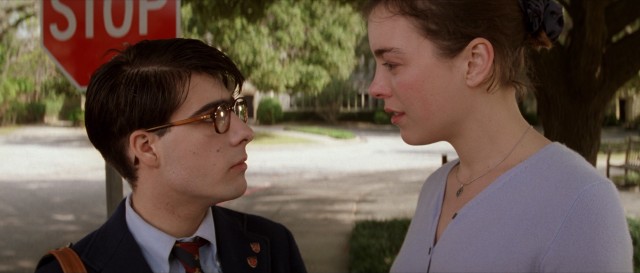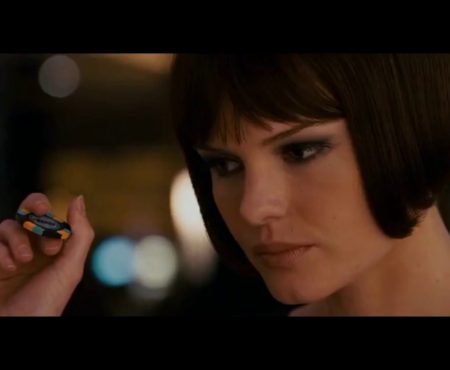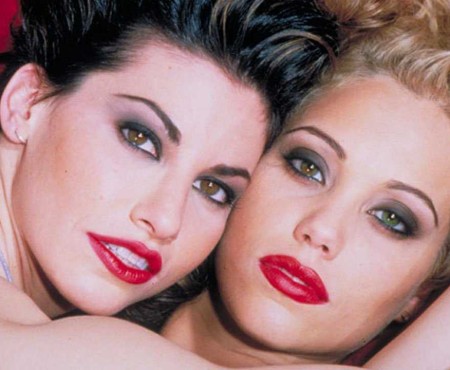Any discussion about movie soundtracks must eventually come around to Wes Anderson. His soundtracks are one of many completely unique authorial touches, as there is no more mistaking a Wes Anderson soundtrack than there is a Wes Anderson visual tableau or Wes Anderson (plus Owen Wilson, Noah Baumbach, or Roman Coppola, depending on the film) stylized, literary screenplay. What sets Anderson’s song choices apart from nearly everyone else in cinema is that, outside of musicals, songs on a soundtrack rarely have any textual connection to the film beyond the broadest general sense. Popular songs are often picked for being popular, or for their visceral impact, but Anderson goes deeper, frequently selecting tracks whose lyrics interplay with his script, occasionally to great effect. For a specific example, we turn to this week’s song, Faces’ “Ooh La La,” from the end of Rushmore.
Rushmore opens with a similarly effective track, The Creation’s “Making Time,” set in a clever counterpoint to a list of protagonist Max Fischer’s dizzying array of extracurricular activities. Still, beyond the rather obvious play on words, the pounding, insistent garage rock of “Making Time” serves mainly as a more traditional needle-drop, setting a loud, dirty, fast tone for the film. It’s a very good choice by Anderson—and one that introduced the song to all but a tiny handful of second-tier British Invasion obsessives—but it’s also very much an act of misdirection on his part. He wants his audience to think Rushmore is this loud fuck-you punk rock movie about this awesome rebel kid coming in, only to gradually have that facade pulled away in pieces, revealing a quieter, more vulnerable admission that the young are very young, and for all their vigor they have much to learn from the slower and more aged. Thus the famous refrain “I wish that I knew what I know now, when I was younger” of “Ooh La La.”
It’s a song of almost unbearable beauty, an elegy for Faces as a band, itself a makeshift entity made up of refugees from the Small Faces and Jeff Beck Group; Rod Stewart had one foot out the door on his way to becoming the Rod Stewart at whom we wince today, and so it fell to guitarist Ronnie Wood to take lead vocals for the final song on their last album. Wood’s awkwardness as vocalist is actually one of the song’s great strengths; the unpracticed sincerity counterpoints the skill of his guitar playing, with each contributing as much emotional impact of the other. The song itself is similarly operating on two levels, one of which is a rowdy, folk singalong, the other being a deeply sad lament. All of this makes it a perfect choice for the conclusion of Rushmore, a story that both ends neatly, with the appearances of a happy ending (in a very Shakespearean comedy sense), and yet refuses to definitively resolve that which simply can’t be.
Rushmore‘s main story deals with the love triangle that forms between unlikely friends Max Fischer and industrialist Herman Blume and the schoolteacher Rosemary Cross, with whom both are smitten. Max is still a teenager, Blume is married, both of which complicate things. Eventually Ms. Cross finds herself in love with Blume, which Max eventually is forced to accept. Faced with a reality he cannot overcome by simple youthful energy and dedication, Max concedes and attempts to undo the sabotage he’d (at times hilariously) done to their relationship. At the end of the film, he finds himself partnered romantically with Margaret Yang, who is not the girl of his dreams, but the girl of his reality.
It would be an insultingly reductive reading of Rushmore to boil the entire film down to that one moral decision, as it’s a tale made as much by the skill of its tellers and the lushly detailed world they create than it is the empirical essence of the story. But the moment at which “Ooh La La” kicks in on the soundtrack—and Wood’s guitar certainly does kick at the start of the song—the emotional catharsis of Max Fischer’s coming of age comes, for lack of a better term, of age. It is a point at which cineastes with properly functioning tear ducts begin to sob uncontrollably, not because the end of Rushmore is particularly sad but because there is simply so much emotion in it. It’s as if, with divine finesse, Anderson lands his masterpiece and then puts a song, the perfect song, on the record player.
As an ending, it’s a thing of rare, aching beauty. The ache comes from the knowledge that the lament “I wish that I knew what I know now, when I was younger” may have made for a shorter movie, but that the impossibility of so knowing is the very stuff of which life itself is made. It’s a truth made of the very essence of life itself.





















One thought on “The Needle Drop: “You’ll Have To Learn, Just Like Me”: Faces’ “Ooh La La” and Rushmore”
I do love that Faces song and I was glad to hear that version though I heard Rod Stewart’s remake of it first which was OK. The Faces version is so much better. That was before Rod was going to become the laughing stock of the world with awful spandex pants, semen stories, and all sorts of weird shit.